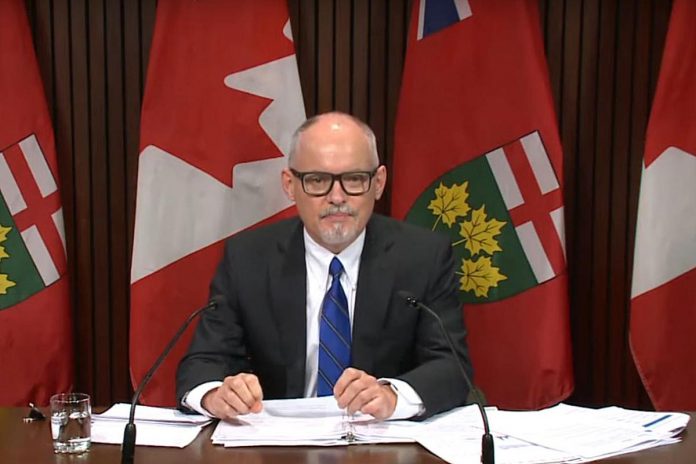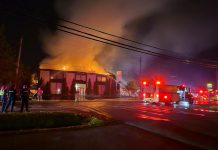
With the emerging threat posed by the COVID-19 omicron variant, the Ontario government announced on Tuesday (December 14) additional public health measures affecting long-term care and retirement homes.
“While there is still some uncertainty around the virulence of omicron, we have good evidence that it is more transmissible than the delta variant, and it is spreading among fully vaccinated individuals,” said Dr. Kieran Moore, Ontario’s chief medical officer of health, at a media conference on Tuesday afternoon.
Even though COVID-19 cases in long-term care homes have fallen steadily over the past few months due to “vigilant policies” and a high vaccination rate — with 99 per cent of long-term care staff, students, and volunteers fully vaccinated and more than 86 per cent of eligible residents having received three doses of the vaccine — the government is adjusting its COVID-19 policies in long-term care homes as part of a “cautious approach” because of the omicron variant.
“Data suggests that each omicron case is infecting four to eight times more individuals than the delta variant, and it is rapidly becoming the dominant strain in Ontario,” Dr. Moore said.
He added that even if omicron results in less severe COVID-19 illness than delta, which evidence so far suggests is the case, there may be significant demands on the health care system with so many people infected.
“This also means that we must take steps to protect our most vulnerable, including putting in place enhanced measures to limit the spread of COVID-19 and protect long-term care residents, staff, and caregivers,” he said.
Effective immediately, all general visitors to a long-term care home will need to be fully vaccinated to enter a home.
As of Friday (December 17), the following additional measures will go into effect at long-term care homes:
- Testing of all staff, students, volunteers, and caregivers — regardless of their vaccination status — at least twice a week prior to entry into the home, as part of enhanced active screening practices.
- Requiring a negative test upon entry to a long-term care home for all visitors and support workers who provide essential services to a resident or to the facility, unless they had a negative test the day before.
- Requiring caregivers to be fully vaccinated, unless they have a valid medical exemption or are attending to a resident in a palliative end-of-life situation. Caregivers will be required to have a first dose by December 20, and all required doses to be considered fully vaccinated by February 21, 2022. In the interim, designated caregivers who are not fully vaccinated would need to restrict their visit to the resident’s room.
- Limiting indoor visits to a maximum of two people per resident at a time and outdoor visits, where feasible, to a maximum total of four people per resident at a time.
- Cohorting of residents for higher-risk activities, such as singing and dancing, and discouraging large social activities. This is in addition to the cohorting of residents during meal times, which is currently occurring.
- Limiting social day trips to only residents who are fully vaccinated and requiring those residents who leave the home for social reasons to be actively screened upon their return to the home and if they had a known exposure to a case, isolated and tested using a PCR test. All residents, regardless of vaccination status, can continue to leave the home for essential reasons, such as medical appointments.
- Suspending overnight absences for social purposes regardless of residents’ vaccination status. Residents who wish to leave the home overnight for social purposes or due to COVID-19 may be temporarily discharged and need to follow the re-admission protocol to return at a later date.
As of Wednesday, December 22th, the following additional measures will go into effect at retirement homes:
- Requiring rapid antigen testing for staff, volunteers, contractors and essential caregivers, regardless of vaccination status, two times per week prior to entry into the home as part of enhanced active screening practices.
- Requiring rapid antigen testing for general visitors and support workers entering a retirement home, regardless of vaccination status.
- Strongly encouraging retirement homes to restrict general visitors to only those who are fully vaccinated and implementing additional requirements for essential visitors and general visitors who are not fully vaccinated when entering a retirement home.
- Limiting the number of visitors and group sizes for social activities and events.
- Implementing additional testing and isolation requirements for residents when they return from an overnight absence.
- Instructing retirement homes to increase infection prevention and control (IPAC) audits.
The government also announced it has asked all primary care providers and their teams in Ontario to make the administration of first, second, and booster doses as quickly as possible, while maintaining essential and critical clinical services.
This could include the “careful deferral” of non-essential clinical services to further support local vaccination efforts over the coming weeks.



























